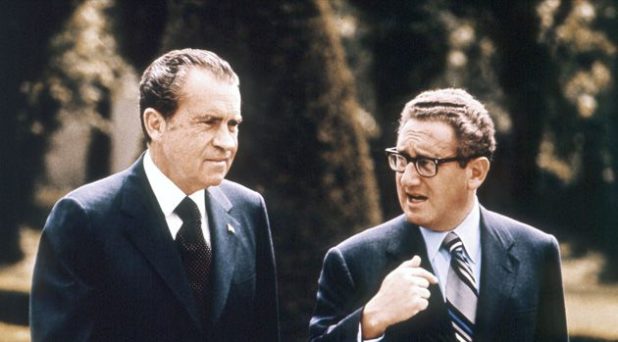Diversity Macht Frei
March 4, 2017
On February 22, 1969, he sent a memo to Secretary of State Rogers and Henry Kissinger on a subject he knew better, the Middle East: I have noted in reading the papers prepared by the State Department and by the Security Council Review Board on the Mideast, references from time to time on “domestic political considerations.” The purpose of this memorandum is twofold:
(1) Under no circumstances will domestic political considerations have any bearing on the decisions I make with regard to the Mideast.
(2) The only consideration which will affect my decisions on this policy will be the security interests of the United States. In the future, I want no reference to domestic political considerations to be included in any papers.
On one level the order was about Israel, and thus about the strong support of Israel by American Jews. Richard Nixon did not like “our Jewish friends” or “New York Jews” or “the fucking Jews”—phrases he regularly used in private, projecting a rhetorical anti-Semitism not uncommon to Republicans of his time, though in his case more vulgar. He sometimes called Kissinger “Jew-boy” or “my Jew-boy,” usually when his associate in foreign policy was not in the room, but occasionally when he was.
He had already told his national security adviser that the one area of the world where Rogers would have primary authority would be the Middle East. Nixon was determined to improve relations with the Arab countries equally determined to destroy Israel—Arab countries becoming more dependent on aid and weapons from the Soviet Union—and he thought there was little chance Arab leaders would welcome a Jewish emissary from the United States. Also, Kissinger had never been in an Arab country. Besides, as the President would tell anyone who would listen, “The Jews voted 95 percent against me.”
… The next day, Nixon met with King Hussein of Jordan, who came with messages from Gamal Abdel Nasser of the United Arab Republic (Egypt). The thirty-three-year-old king said that he and the Egyptian ruler had been polar opposites in the Arab world but had been drawn together by crushing defeat in the 1967 war with Israel and by the internal dangers and pressures of increasing Arab extremism in their countries since that defeat. He said he had been authorized by Nasser to tell Nixon that the United Arab Republic would like to reestablish diplomatic relations with the United States and that all Arabs were willing to negotiate a “just and honorable” settlement document with Israel—anything short of a formal peace treaty.
“The Arabs have learned,” said Hussein, whose country was home to more Palestinian refugees than Jordanian citizens since the 1967 war, “that Israel’s right to exist is now unchallenged.” The President was interested. He said the United States wanted a settlement and asked Hussein to prepare informal proposals on borders in the area, with emphasis on what to do about Jerusalem, which had been divided between Israeli and Jordanian control before 1967, but now, along with all the territories of the West Bank of the Jordan River, was occupied by Israel.
Nixon was greatly impressed with Hussein. As he waved good-bye outside the White House—when he liked the leaders of other nations he would walk with them right up to their cars in the driveway—he turned to a State Department official and said: “We’ve got to help the King. We cannot let the American Jews dictate policy.”
… The first Gallup poll after the Mobe [these were antiwar demos] showed Nixon at new highs, with a 68 percent approval rating. But those numbers had not helped Haynsworth. On November 21, the Senate voted fifty-five to forty-five against his confirmation as a Supreme Court justice. The President was as angry as he was newly popular. During one of several tantrums over the courts and Haynsworth and also over the increasing coverage and investigations of the My Lai killings, the President slammed his desk and said, “It’s those dirty rotten New York Jews.”
[About the situation in the Middle East] … On the American side, the game was complicated by Nixon’s determination not to give in to pressure from American Jews to give Israel whatever it asked for, and by the corrosive contempt and suspicion between Kissinger and Secretary of State Rogers.From the beginning, the President had given Rogers control over Mideast policy, because of Kissinger’s ignorance of that part of the world and because he did not like the idea of an American Jew dealing with Arabs fighting Israeli Jews. In fact, American policy in the area was called the “Rogers Plan”—the Secretary’s proposal for a return to something like the region’s pre-1967 borders in exchange for Arab recognition of Israel’s sovereignty—the Jewish state’s right to exist. Land for peace.
[Regarding the leak of what came to be known as the “Pentagon papers”, related to the Vietnam war]There were only fifteen copies. Five were in Laird’s safe at the Pentagon, and the Secretary occasionally referred to them for background on bombing decisions. There were copies at the Kennedy and Johnson presidential libraries. Seven had gone to former Johnson administration officials, including Robert S. McNamara and his successor as secretary of defense, Clark Clifford. Two copies, under the control of Gelb and Morton Halperin, who had quit Kissinger’s staff to go to Brookings, were in safes of the RAND Corporation in Santa Monica. Nixon told Haldeman that it might have been someone on Kissinger’s own staff, or just some group of “fucking Jews.”
Kissinger thought at first that the leak consisted of a few pages and probably was done by Laird, his administration rival as a master of the care and feeding of the press. But when Laird told him there were seven thousand pages—sixty pounds of paper—Kissinger knew immediately it could have been only one man, Daniel Ellsberg.
[Ellsberg was responsible for the leak. He was ethnically Jewish although his parents had “converted” to “Christian Science” so Nixon’s intuition was basically correct.]
President Nixon now told Haldeman, once more, to cut off all contact with The New York Times. Warming to the subject the next morning, he talked about the Times and its Washington bureau chief, Max Frankel, adding conversationally: “Don’t give them anything … because of that damned Jew Frankel all the time—he’s bad ….”
…On July 3, the Bureau of Labor Statistics announced one of the largest drops ever recorded in monthly unemployment numbers, from 6.2 percent to 5.6 percent. But The New York Times—under the headline “JOBLESS RATE OFF SHARPLY, BUT DOUBT IS CAST ON DATA”—reported it this way: “The nation’s unemployment rate dropped substantially in June but part of the reason was a statistical aberration, the Labor Department reported….”
In the third paragraph, the story quoted Harold Goldstein, the assistant commissioner of labor statistics, saying that the rate would go up again when high school and college students came home looking for summer work. Nixon’s reaction was explosive: “That little Jew cocksucker is the same guy who screwed us in the Eisenhower administration He’s a radical left-winger who hates us.” He took off from there, telling Haldeman and Colson, not for the first time: “Washington is full of Jews…. Most Jews are disloyal”—he excepted Kissinger, Safire, and Leonard Garment—“Bob, generally speaking, you can’t trust the bastards. They turn on you. Am I wrong or right?” Haldeman said, not for the first time, he was right. Colson added: “You just have to go down the goddamned list and you know they are out to kill us.”
The result was a transfer of Goldstein, a civil service employee, and a presidential order to a White House staffer named Frederick Malek to find out how many Jews were in the bureau. Malek’s answer came back in a memo: “Thirteen of the 35 fit the demographic criterion which was discussed.”
[Excerpted from President Nixon: Alone in the White House by Richard Reeves.]See Part 1 here.
 Daily Stormer The Most Censored Publication in History
Daily Stormer The Most Censored Publication in History



